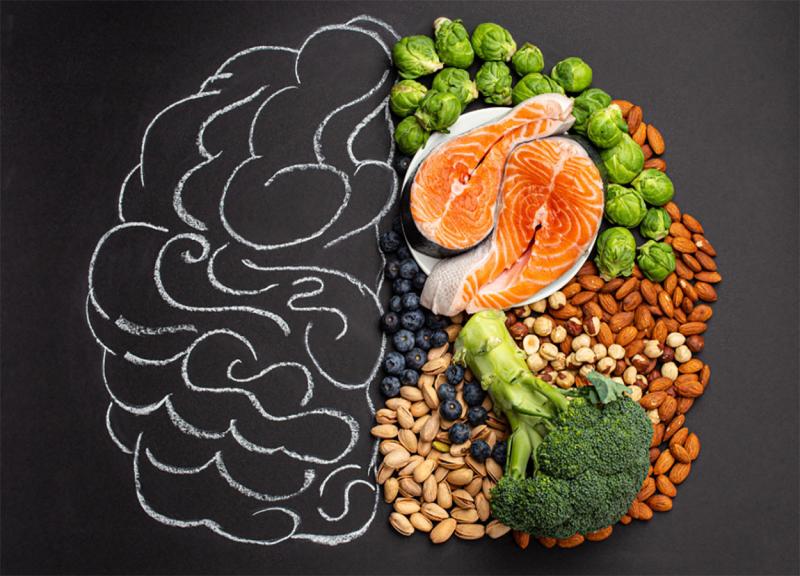Written by Brianna Gaikowski under the direction and review of Anna Tvedt, former SDSU Extension Nutrition Field Specialist.
The brain is a miraculous machine! It is responsible for many aspects of everyday life, like thoughts, memory, emotions, movements, perceptions, and more.3,6,7 Since the brain is so integral to our daily functioning, we notice when it isn’t working its best. Thankfully, many strategies exist to maximize brain health throughout our lives, such as exercise or sleep.4 You may even have brain-boosting foods and beverages in your fridge or pantry!
What is Brain Health?
There is no distinct definition for the term "brain health." However, researchers at the British Medical Journal define it as preserving optimal brain integrity, mental and cognitive function, and the absence of visible neurological disorders.7
Your Diet and Your Brain

Did you know that diet can play a vital role in brain health? Numerous studies have linked a balanced, nutrient-dense diet to better brain health. While today’s science does not have all the answers about how diet can impact the brain, substantial research indicates benefits from certain foods and nutrients. Some examples include the following.
- Water
Water is crucial for all cells in the body, including our brain cells, which depend on water to carry out essential functions.1,2 Older adults and children are more susceptible to the negative impacts of dehydration, including impaired cognition.1,2,7 It is important to be intentional about fluid intake each day at all ages. - Vegetables
Substantial research has shown that vegetable intake, especially green leafy vegetables, influences brain health.1,5,6 For example, one study showed that increased intake of green leafy vegetables was associated with a slower rate of cognitive decline in older adults. People who consumed adequate amounts of leafy greens consistently were estimated to have brains approximately 11 years younger than those with the lowest intake.5 This may be because leafy greens are rich in vitamins and antioxidants ( including vitamin K, lutein, folate, and beta-carotene).1,5,6 - Antioxidant-Rich Foods
Eating a diet rich in antioxidants can help reduce the risk of oxidative stress. Oxidative stress occurs when there is an imbalance between free radicals and antioxidants. Free radicals are unstable molecules that can lead to tissue and organ damage, including the brain. Antioxidants counteract these effects.1,2 They include specific vitamins, like C and E and other compounds found in plant foods. Berries contain some of the highest levels of antioxidants. Other higher-level foods include nuts, olive oil, vegetables, and beans.2,3,6 - Healthy Fats
Our brains are comprised of over 60% fat and need fat to function correctly.3, 6 Most adults get plenty of overall fat in the diet, but they often need more of certain healthy fats, like omega-3s. One type of omega-3, DHA, is beneficial for overall brain development and cognitive function. DHA is primarily found in fatty fish, like salmon, tuna, sardines, and herring. Other healthy fats include olive oil, avocados, and nuts, all of which have been shown to enhance learning and memory.1,3,4,6
In Summary
Rather than thinking about what to limit, focusing on all the delicious foods to include is much easier! Since the foods listed above may already be in your kitchen, you can boost your brainpower as soon as your next snack or meal. Otherwise, you can add it to your cart the next time you visit the grocery store! You only have one brain. Remember to treat it and feed it right!
Sources
- Bianchi, V. E., Herrera, P. F., & Laura, R. (2021). Effect of nutrition on neurodegenerative diseases. A systematic review. Nutritional neuroscience, 24(10), 810-834.
- Flanagan, E., Lamport, D., Brennan, L., Burnet, P., Calabrese, V., Cunnane, S. C., ... & Vauzour, D. (2020). Nutrition and the ageing brain: Moving towards clinical applications. Ageing research reviews, 62, 101079.
- Gómez-Pinilla F. (2008). Brain foods: the effects of nutrients on brain function. Nature reviews. Neuroscience, 9(7), 568–578.
- Mintzer, J., Donovan, K. A., Kindy, A. Z., Lock, S. L., Chura, L. R., & Barracca, N. (2019). Lifestyle Choices and Brain Health. Frontiers in medicine, 6, 204.
- Morris, M. C., Wang, Y., Barnes, L. L., Bennett, D. A., Dawson-Hughes, B., & Booth, S. L. (2018). Nutrients and bioactives in green leafy vegetables and cognitive decline: Prospective study. Neurology, 90(3), e214-e222.
- Tabassum, N., Rasool, S., Malik, Z. A., & Ahmad, F. (2012). Natural cognitive enhancers. Journal of Pharmacy Research, 5(1), 153-160.
- Wang, Y., Pan, Y., & Li, H. (2020). What is Brain Health and why is it important?. The BMJ.


